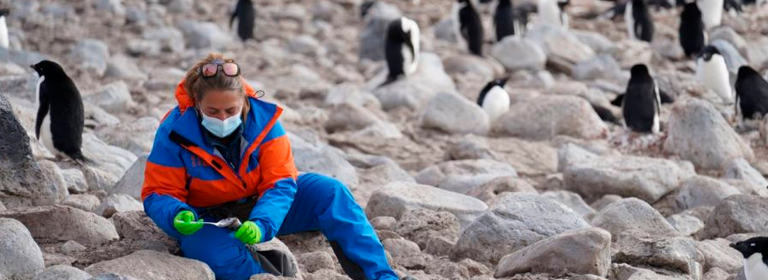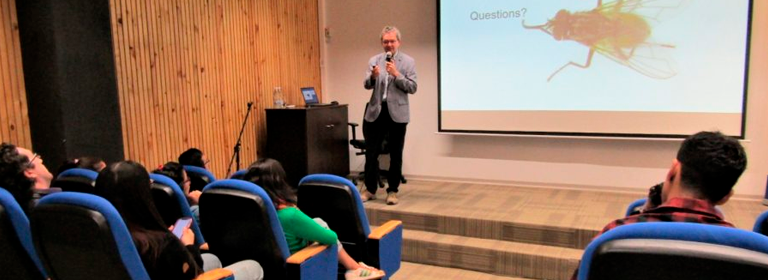The alternate director of the Millennium BASE Institute, Julieta Orlando, emphasized the significance of the white continent for the planet, during a keynote talk organized by the Center for Research and Advanced Studies of the Universidad Católica del Maule.
 «Protecting Antarctic biodiversity is important for humanity.» With this statement, the alternate director of the Millennium BASE Institute, Julieta Orlando, emphasized why the frozen continent is considered the heart of the planet, during a master lecture she gave at the Universidad Católica del Maule (UCM).
«Protecting Antarctic biodiversity is important for humanity.» With this statement, the alternate director of the Millennium BASE Institute, Julieta Orlando, emphasized why the frozen continent is considered the heart of the planet, during a master lecture she gave at the Universidad Católica del Maule (UCM).
«While Antarctica looks remote and isolated, it is very interconnected. What happens there can affect other latitudes, including permanent human settlements, and therefore the protection of that biodiversity not only takes care of that balance, but also the global one,» said the associate professor of the University of Chile in the activity organized by the Center for Research and Advanced Studies of Maule (CIEAM, in Spanish), belonging to the campus.
The event, which was attended by the dean of the Faculty of Agricultural and Forestry Sciences of the institution, Claudio Fredes, was aimed at commemorating Antarctica Month.
 «It is also important to maintain the balance in this territory because there are many resources within the biodiversity that are not yet known but could prove useful in the future,» stated the PhD of Sciences, who has made several contributions to polar research, considers both charismatic and well-known organisms, as well as imperceptible microorganisms that could mitigate climate change.
«It is also important to maintain the balance in this territory because there are many resources within the biodiversity that are not yet known but could prove useful in the future,» stated the PhD of Sciences, who has made several contributions to polar research, considers both charismatic and well-known organisms, as well as imperceptible microorganisms that could mitigate climate change.
The scientist has participated in ten expeditions to the southernmost continent in the world, which celebrates its day every November 6, commemorating the milestone established by former President Pedro Aguirre Cerda when he defined the limits of the Chilean Antarctic Territory in 1940.
«The Chilean Antarctic Institute, INACH, envisions Antarctica being recognized not just on a specific day, but throughout a whole month, so that all people, even from Arica, Iquique or Antofagasta, can feel that this territory is an integral part of their country and the planet,» she emphasized.
 In addition to Orlando, doctors Aparna Banerjee, Alexis Castillo and Felipe Gordillo, as well as the director of CIEAM and researcher at the Millennium BASE Institute, Hugo Benítez, shared their experiences on the white continent.
In addition to Orlando, doctors Aparna Banerjee, Alexis Castillo and Felipe Gordillo, as well as the director of CIEAM and researcher at the Millennium BASE Institute, Hugo Benítez, shared their experiences on the white continent.
«The center has two Antarctic science projects that were awarded two years ago. With this event, we aimed to showcase our high-level research in the Antarctic environment, and invite students to participate of it with internships and doctoral or master’s theses,» said Benítez.













